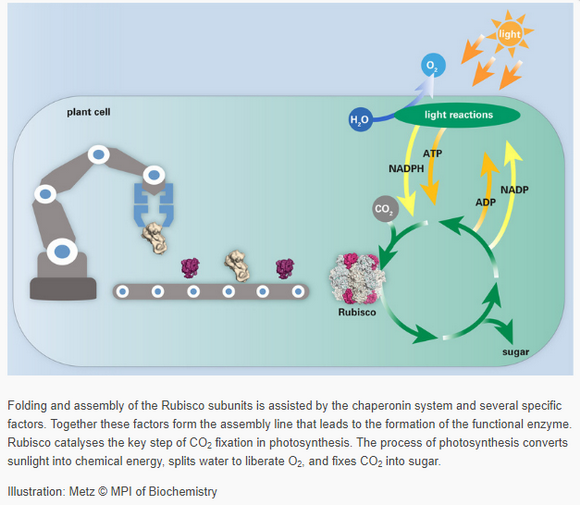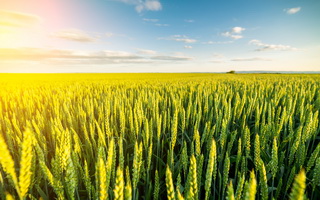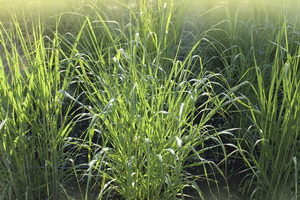|
|
Max Planck Researchers Engineer Key Enzyme in Photosynthesis |
|
Researchers at the Max Planck Institute of Biochemistry have succeeded in producing functional plant Rubisco in a bacterium, allowing genetic engineering of the enzyme. Rubisco, a critical enzyme in photosynthesis, catalyzes the first step in carbohydrate production in plants, the fixation of CO2 from the atmosphere. The researchers, led by Dr. Manajit Hayer-Hartl, generated functional plant Rubisco in a bacterial host by simultaneously expressing plant chaperones and Rubisco in the same cells. This enabled the scientists to understand the complex assembly pathway of Rubisco, and also modify the Rubisco gene to improve its properties. Once they have obtained a Rubisco variant with a desired trait, they can insert the modified gene back into the plant cells, a key-step towards improving photosynthesis through Rubisco engineering. "The bacterial expression system resembles an assembly line for cars. Whereas previously, every optimized variant of Rubisco had to be painstakingly expressed in a transgenic plant, which takes a year or more to generate - like building a car by hand - we can now make hundreds or thousands of Rubisco variants in days or weeks. It is like building cars in an automated assembly line," explains Dr. Hayer-Hartl. 
For more details, read the Max Planck Institute of Biochemistry news release.
|
|
|
|
|
New Technique to Help Plant Breeders Develop Drought Resistant Varieties Faster |
 Scientists from the Canadian Light Source (CLS) have teamed up with researchers from the University of Saskatchewan (U of S) to develop a new technique to examine drought tolerance in wheat. Led by Chithra Karunakaran and Karen Tanino, the team developed a simple non-destructive method to screen hundreds of wheat leaf samples in a day, reducing the time and cost associated with traditional breeding programs to select varieties for drought tolerance. Scientists from the Canadian Light Source (CLS) have teamed up with researchers from the University of Saskatchewan (U of S) to develop a new technique to examine drought tolerance in wheat. Led by Chithra Karunakaran and Karen Tanino, the team developed a simple non-destructive method to screen hundreds of wheat leaf samples in a day, reducing the time and cost associated with traditional breeding programs to select varieties for drought tolerance.
|
|
|
|
|
Lignin Reduction Observed in CRISPR-Edited Switchgrass |
 Lignin, a major component of the plant cell wall, stands as a barrier to efficient biofuel production from switchgrass (Panicum virgatum). While the advent of genome editing technologies offers new opportunities for improving switchgrass, its allotetraploidy (2n = 4x =36) may make it difficult to engineer. Lignin, a major component of the plant cell wall, stands as a barrier to efficient biofuel production from switchgrass (Panicum virgatum). While the advent of genome editing technologies offers new opportunities for improving switchgrass, its allotetraploidy (2n = 4x =36) may make it difficult to engineer.
|
|
|
|
|
|
|

|
A biweekly update on gene editing research, regulations, and impact
produced by ISAAA Inc. |
| |
|
|

|
| A monthly update on gene drive research and development provided by ISAAA in collaboration with the Outreach Network for Gene Drive Research |
| |
|
|
|
|
GM APPROVAL UPDATES |
- The Philippines approved the canola event LBFLFK for food, feed, and processing.
- The Philippines approved the cotton event GFM cry1A for commercial cultivation.
- Brazil approved the wheat event HB4 for commercial cultivation.
- The Philippines approved the soybean event GMB 151 for food, feed, and processing.
- The Philippines approved the eggplant event EE-1 for cultivation
- The USA approved the canola event MON94100 for food and feed.
|
|
|
|
| Biotech Updates is a weekly newsletter of ISAAA, a not-for-profit organization. It is distributed for free to over 22,000 subscribers worldwide to inform them about the key developments in biosciences, especially in biotechnology. Your support will help us in our mission to feed the world with knowledge. You can help by donating as little as $10. |
|
|
|
|